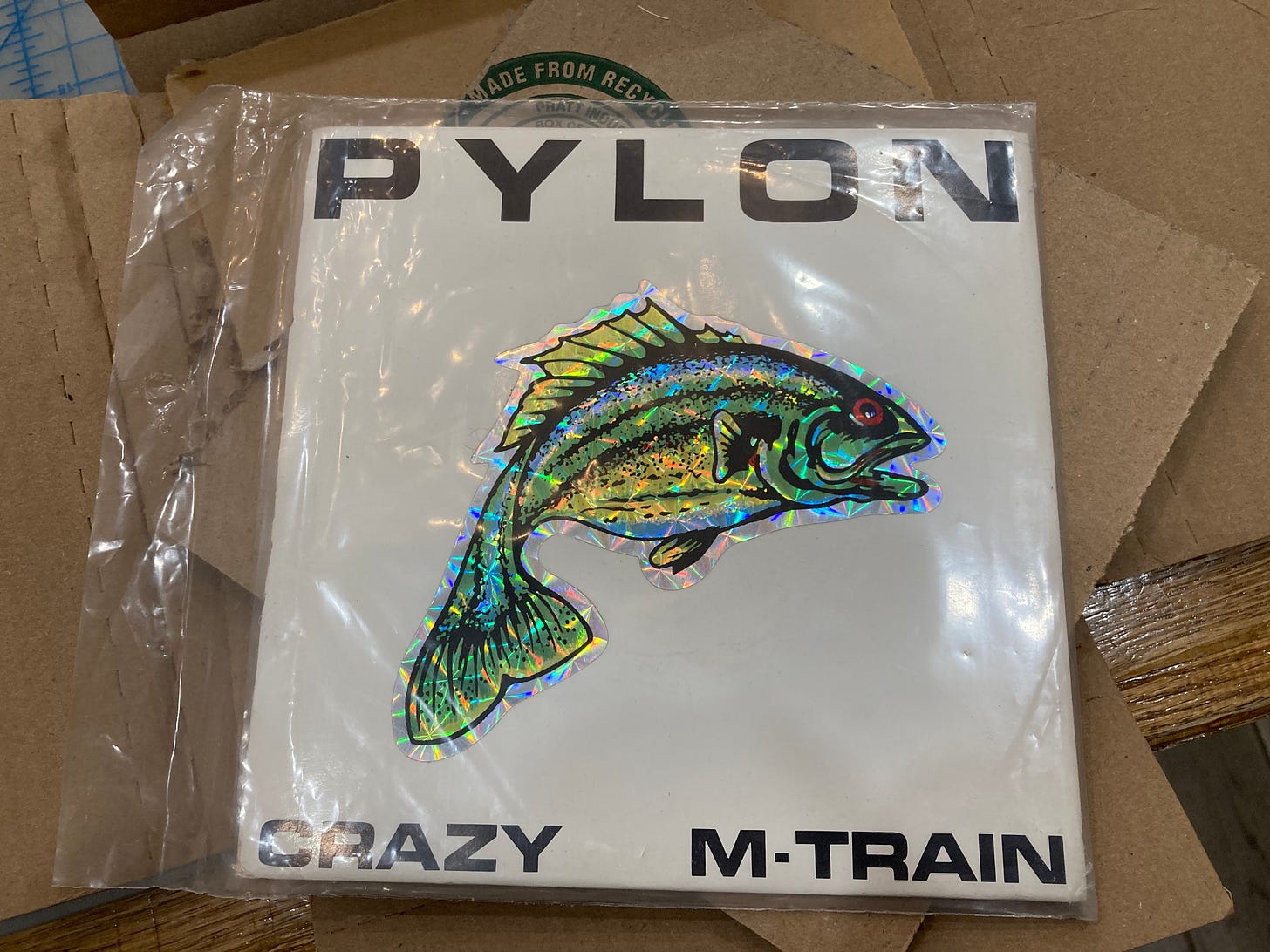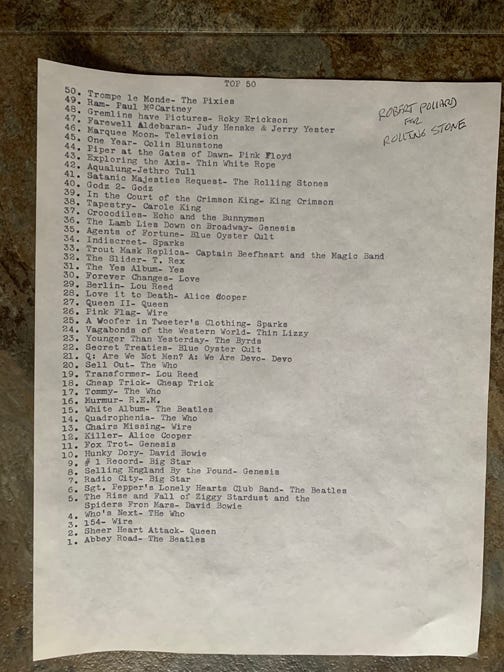perfection + lists

Today’s post is connected to tomorrow’s post, the first of our subscriber-only discussion threads. Subscribe now to become part of this community. Or subscribe in a few hours. Non-subscribers will not see that thread, so please be a subscriber. (Alternately, you could subscribe.)
You see that 7-inch up there? Pylon’s 1981 single, “Crazy,” the original version with the boat sticker? That is a perfect recording but it is not in the Spotify playlist below.
I just bought it from a man in Georgia. I sold my original years ago, like a fool.
You’ll want this playlist even if you don’t care about all this list folderol.
The original 7-inch version of the Pylon song will be on Spotify soon, as part of a genuinely great box set coming out on November 6. “Crazy” (their composition, not the Patsy Cline song also on my list) may or may not be a perfect song—I am only asserting that the 1981 version is a perfect recording. I can’t say what a perfect song is, because that suggests a comparison of like to like, of one song to all other songs. That is beyond any reasonable assessment I can make.
My idea about perfect recordings only considers the thing in relation to itself: this song, with these musicians, recording with this gear, in this pocket of air, on this day, creating this particular recording. When all of those things align, the thing is perfect unto itself. It is a view of events that looks only to particulars and creates a general category from a lack of general principles. It’s impossible by design, like life.
As the kicker for this 2014 New Yorker piece about perfect recordings and list-making asserts, “none of this is accurate, and all of it is true.” Most of the links in that piece are no longer relevant (whomst was Rdio?) though I still like this short Q&A with Lilah Raptopolous in the Guardian. The Beyoncé hate in the comments feels prelapsarian.
The idea here is: lists serve a function that has become clearer to me over time. Lists are the first thing I wrote, as far as memory tells me. I was six when I got into a fight with my Mom about anxiously stuffing lots of little pieces of paper into a Blue Diamond almond can. I have ranked things, many times—just look at these lists from my long-gone original blog. I believed in ordinal ranking. I no longer do.

Look at the below list, put together by Robert Pollard for the poll that resulted in the recent 500 Greatest Albums issue of Rolling Stone.
I am not here to breathe dry ice at Rolling Stone and act a priest. Pick up The New Rolling Stone Album Guide and you will see me giving stars to Bad Brains and Funkadelic albums. Lists are fun for people to make, they drive traffic, they make people mad and sticky, and they magically induce engagement. Look how many people hop on Twitter to get big mad about the rankings.
This is not big mad, but it is my reaction to the Rolling Stone list:
That Pollard list crystallizes my objections to rankings. It seems to be a reflection of all the other lists we’ve been reading for decades as much as anything else. Maybe more than anything else. These lists replicate themselves, giving credence to their authority rather than encouraging the arguments that go into list-making. Much as disinformation works by becoming familiar and exploiting our tendencies to habituate, we end up spending our time on God’s green Earth fighting about whether or not What’s Going On is better than Revolver.
I am not suggesting that you not listen to Marvin or The Beatles or that you stop researching and discussing these artists. I am saying that lists and groupings are fantastic for developing our thoughts and deepening our understandings, moving always toward more flexibility and openness. The Didion sample from my old New Yorker piece still works: “We make ourselves lists in order to know if we think what we think.”
But we don’t make lists to confirm that we know what we know, because these things aren’t knowable. Feelings aren’t facts, and I’d like think adults know that.

I would love to see more lists. Top Twenty Songs Written By Women Employed By The Federal Government At the Time of Recording. 100 Best Albums About Animals. The Only Ten Reggae Songs That Begin Without a Drumroll. The Albums That Best Capture the Shift from Tape to Pro-Tools. And so on.
I don’t think we need to seek Constitutional calcification with these lists. By all means, listen to The Faces and The Kinks and Wire. But, no, don’t spend any time yanking them fifty years into the future and pretending their momentary ranking means anything other than “click here.” Discussion and argy bargy are easily found now, which is all the more reason to point it at something useful.
So bring your ideas tomorrow, for lists that make sense and lists that drive you mad. We can work it out (in the thread).







